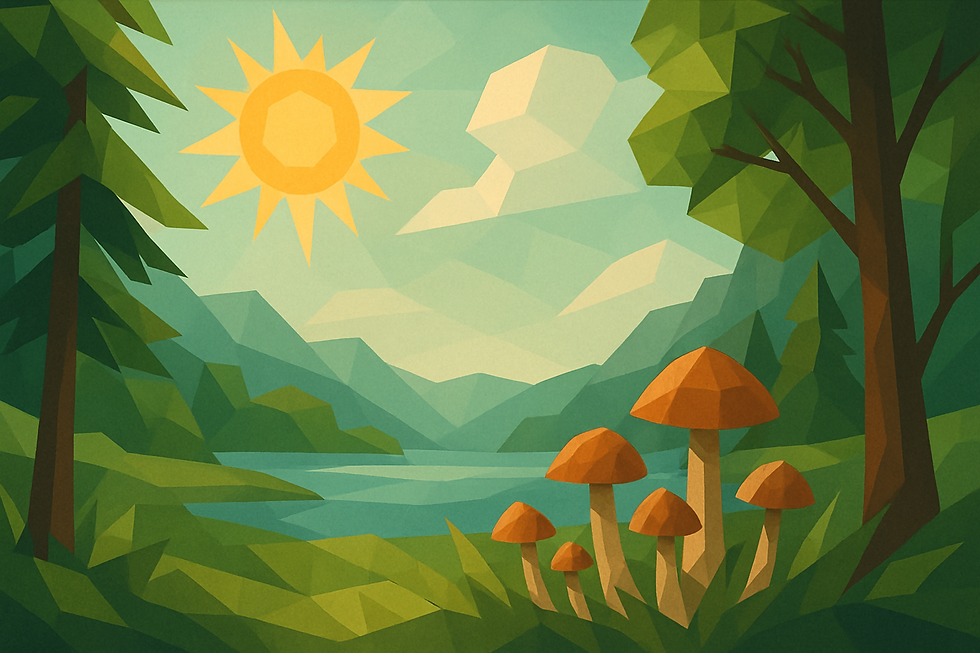Unlocking Creativity with Psilocybin: Insights from Artists and Innovators
- Edward Hawthorne

- May 20
- 4 min read

Introduction: A Curious Question
What do Steve Jobs, Nobel Prize-winning chemist Kary Mullis, and an alarming number of indie folk musicians have in common?
Answer: Psilocybin.
That’s right. The humble psychedelic mushroom, once feared and misunderstood, has become an underground (and increasingly mainstream) catalyst for artistic breakthroughs, business innovation, and imagination unshackled. From Silicon Valley boardrooms to candle-lit songwriting sessions in mountain cabins, psilocybin is being microdosed, macrodosed, and creatively revered.
So, how exactly is this magical fungus helping artists, entrepreneurs, and big-thinkers unlock their creative genius? Let's dive into the science, the stories, and a few cautionary tales.
A Brief History of Psychedelics in Creativity
Long before psilocybin was studied in labs, it was being revered in ceremony. Indigenous cultures across the Americas used mushrooms for healing, spiritual insight, and—let’s face it—probably some pretty trippy cave art. Fast forward to the 20th century, and psilocybin made its way into the minds of some of the century's most influential creators.
Kary Mullis famously credited LSD (a chemical cousin of psilocybin) for inspiring the invention of PCR, the technique that revolutionized genetics. Steve Jobs claimed that using LSD was one of the most important things he’d ever done. While neither used psilocybin exclusively, it’s no secret that many artists and thinkers blend experiences across the psychedelic spectrum.
In today’s world, where the hustle often trumps the muse, many creatives are turning to microdosing psilocybin as a way to tap back into their innate curiosity and imaginative fire—without the full-blown psychedelic journey.
What the Science Says (and Doesn’t Say)
According to a 2019 study in Frontiers in Psychology, psilocybin has been linked to increased divergent thinking—the kind of thinking that opens doors instead of closing them. Participants showed greater creative fluency and originality after consuming microdoses.
But it’s not all sunshine and synesthesia. The science is still young, and many studies rely on self-reporting or small sample sizes. As discussed in Week 10: The Science Behind Psilocybin, we’re only just beginning to understand how psilocybin alters neural pathways. One known effect is the dampening of the Default Mode Network (DMN), the brain’s habit loop of self-referential thought.
In short: psilocybin helps quiet the inner critic. That voice in your head that says "this idea sucks"? Temporarily muted. And for artists and entrepreneurs trying to build something from nothing, that silence is golden.
Real Stories from the Creative Trenches
Let’s talk about modern creatives. Take Reggie Watts, a musician and comedian who blends absurdism with virtuosic loop pedal mastery. He’s been open about how psychedelics help him see connections that aren’t visible in default consciousness.
Then there’s the anonymous graphic designer from Vancouver who shared in our Week 7: Microdosing for Awareness and Mindfulness post that microdosing helped her push past a three-month design block. "I wasn’t seeing the problem from the right angle. The mushrooms helped me literally shift perspective."
The common thread? A sense of looseness, freedom, and "flow." Whether you’re designing a logo, writing a novel, or solving a complex algorithm, creativity often hinges on novelty—and psilocybin is a proven novelty generator.
The Method Behind the Magic
So how are creatives actually using psilocybin?
Microdosing: Small, sub-perceptual doses (often 50-150mg of dried mushroom) taken every few days. See Week 3: A Beginner's Guide to Microdosing for more.
Macrodosing: Reserved for deeper journeys, often for resetting creative direction or breaking through existential blocks. See Week 12: Micro vs. Macro.
Ritual Dosing: Using psilocybin in a structured, intentional setting—journaling, walking in nature, or collaborating with a trusted partner.
Importantly, many creatives emphasize set and setting. Your mindset going in and the environment you choose can dramatically affect your experience. (Note: we highly recommend reading Week 16: How to Plan Your Psilocybin Experience if you're new to this.)
Challenges and Caveats
This wouldn’t be a responsible post if we didn’t mention the potential pitfalls.
Too Much, Too Fast: Creativity can be a fine line between inspiration and incoherence. Macrodosing without intention or support can result in unproductive rabbit holes.
Integration Issues: Great ideas are only as good as your ability to apply them. Without integration, insights can fade like a dream.
Legal & Professional Risks: Psilocybin is still federally illegal in many places, including Canada (with exceptions for clinical trials and certain exemptions). As always, know the laws and your own risk tolerance.
But perhaps the biggest challenge? Over-romanticizing the tool. Psilocybin won’t make you a great artist. It will only remove the noise for a while so you can hear your inner voice more clearly. The hard part—showing up, doing the work, and editing ruthlessly—is still on you.
Final Thoughts & Actionable Takeaways
The link between psilocybin and creativity isn’t new, but it’s undergoing a renaissance. In a world that often prioritizes productivity over imagination, the mushroom is quietly helping people reconnect with their wild, original minds.
Here’s how to begin your own exploration:
Start small. Try microdosing first. Our Capsules, Gummies, Tea post can help you choose your format.
Pick your moment. Choose low-pressure creative tasks at first: journaling, sketching, brainstorming.
Track your ideas. Keep a notebook handy. Some of your best insights may be fleeting.
Don’t skip integration. Make time the next day to review what came up and how it might apply.
Stay grounded. Nature walks, good music, and friends who get it can go a long way.
Creativity isn't something you find. It's something you allow. And sometimes, all it takes is a small shift in consciousness to remind you of the genius that was there all along.



Comments